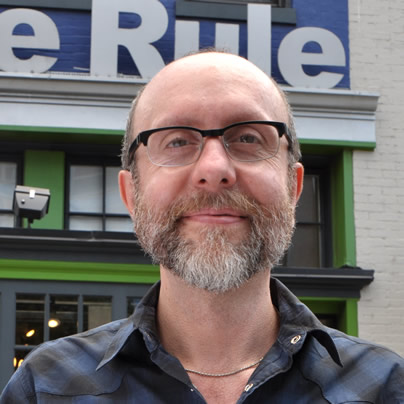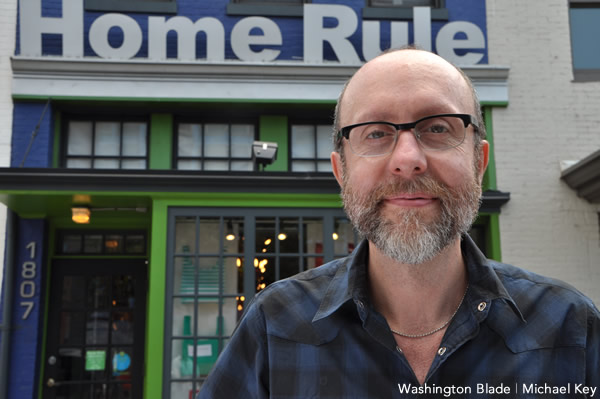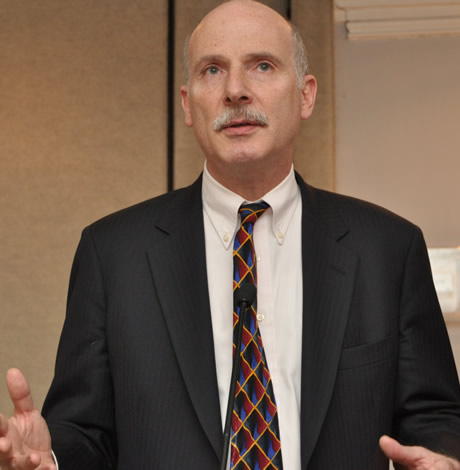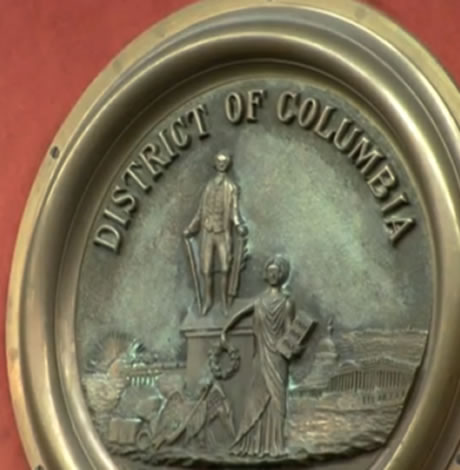Arts & Entertainment
Queery: Rod Glover
The Home Rule co-owner answers 20 gay questions

It started with a brainstorming session. In 2000, Home Rule (1807 14th St., N.W.; homerule.com) owners Rod Glover and his business partner Greg Link were brainstorming ideas for how to generate an influx of business in notoriously slow August so they could afford trips to retail shows at which they could order merchandise for fall.
They came up with the idea for a sidewalk sale and persuaded about seven of their neighbors to join them. It was a hit — they took all their merchandise, set it up out front and were soon on their way to the shows.
Though they’re not as involved in the planning of it now, the tradition continues. Look for the 13th annual MidCity Dog Days Sidewalk Sale this weekend from 9 a.m. to 8 p.m. Saturday and 10 a.m. to 7 p.m. Sunday where about 70 businesses in the area around P and 14th (stretching up to U Street) bring their wares outdoors for the weekend (midcitydogdays.com).
“We just kind of take everything that’s been sitting on the shelf for the last nine months or been taken off the shelf, and move it out to the sidewalk at 50 percent off and it’s a big hit,” Glover says. “It’s very practical housewares stuff. Things people actually need.”
Glover, a 50-year-old Camp Hill, Pa., native, came to D.C. in 1987, his arm twisted by several friends who’d moved here and wanted him to join them. He worked in various retail shops and has always practiced his artwork on the side. He recently exhibited at Gallery Plan B with a show featuring sculpture and found wood he scorched with a propane torch. He and Link opened Home Rule on Labor Day weekend 1999. He says because of the growth in the neighborhood and a loyal customer base, it’s been successful even in the down economy.
Glover and his partner, lawyer Tom Mayes, live together in Dupont Circle. Glover enjoys creating art, cooking, entertaining, magazines and cookbooks in his free time. (Blade photo by Michael Key)
How long have you been out and who was the hardest person to tell?
I came out to my friends in college when I was 19, (and my painting professor) but didn’t come out to my parents until I was 30, on an Easter Sunday, just before I moved into a one bedroom with my partner. That was the hardest. My mother’s immediate response: “Mothers know these things. Is there anyone special?”
Who’s your LGBT hero?
I have two. My partner’s cousin, Mary Margaret “Peggy” Cleveland, because she came out to her North Carolina Presbyterian congregation in her 70s, after having been a missionary in Africa, during a big church debate on the role of LGBT people. And my friend Stephen Skinner, who founded Fairness WV, and who’s running this fall for the West Virginia House of Delegates. If elected, he would be the first openly gay delegate in West Virginia. Support his campaign.
What’s Washington’s best nightspot, past or present?
My apartment. Ask people.
Describe your dream wedding.
It would be just like our friend Jenny Allen’s Hootenanny — a big party with all of our friends, the Speakeasy Boys playing bluegrass, handsome bartenders, barbecue and the Potomac River as a backdrop.
What non-LGBT issue are you most passionate about?
Affordable higher education, affordable health care and the freedom to create.
What historical outcome would you change?
The long persistent influence of Puritanism, here and throughout the world.
What’s been the most memorable pop culture moment of your lifetime?
Three. Seeing Jackie Hoffman on Broadway in “Hairspray,” “Xanadu” and “The Addams Family.”
On what do you insist?
That my friends come to my house, eat my cooking and take leftovers home.
What was your last Facebook post or Tweet?
Katie Petix manages our Facebook for Home Rule. She beats me hands down in posting.
If your life were a book, what would the title be?
“La-Bas,” but it’s already taken.
If science discovered a way to change sexual orientation, what would you do?
Ignore it.
What do you believe in beyond the physical world?
The ghosts that inhabit my cabin in West Virginia. They party so much it keeps me awake.
What’s your advice for LGBT movement leaders?
I don’t really have much of an activist soul, but I deeply admire those who do: Keep at it and thank you.
What would you walk across hot coals for?
The last wedge of Parmigiano Reggiano. And my beautiful nieces.
What LGBT stereotype annoys you most?
Any assumption that prejudges me or others annoys me.
What’s your favorite LGBT movie?
“Trick.” Tori Spelling is fabulously nutty and the movie reminds me of myself and my friend Debbie.
What’s the most overrated social custom?
Being too polite to say you want more.
What trophy or prize do you most covet?
I already have it — the senior art award at high school graduation. I always felt like such an outsider, and I didn’t know in advance, so it meant the world to me. I received the psychology award too — I’m still baffled by that one. My partner says he gets it.
What do you wish you’d known at 18?
How much fun life is.
Why Washington?
In 1987 my friends, who had already moved here, set me up with a job and an apartment. I have the best friends on the planet.
Out & About
Plan your wedding the LGBTQ way
Washington D.C. LGBTQ+ Wedding Expo scheduled for Sunday

Rainbow Wedding Network will host “Washington D.C. LGBTQ+ Wedding Expo” on Sunday, March 1 at 12:30 p.m.
Guests can meet and mingle with a curated selection of LGBTQ-welcoming wedding professionals from across the region, each ready to help bring your vision to life, and spend a beautiful afternoon exploring everything they need to create a celebration that reflects them.
There will be a relaxed, self-guided look at the Watergate’s spaces and amenities, savor signature cocktails and delicious tasting samples, and connect with other couples who are on the same journey.
Visit Eventbrite to reserve a spot.

Friday, February 27
Center Aging Monthly Luncheon With Yoga and Drag Bingo will be at 12 p.m. at the DC Center for the LGBT Community. Email Mac at [email protected] if you require ASL interpreter assistance, have any dietary restrictions, or questions about this event.
Go Gay DC will host “LGBTQ+ Community Happy Hour Meetup” at 7 p.m. at Freddie’s Beach Bar and Restaurant. This is a chance to relax, make new friends, and enjoy happy hour specials at this classic retro venue. Attendance is free and more details are available on Eventbrite.
Trans Discussion Group will be at 7 p.m. on Zoom. This group is intended to provide an emotionally and physically safe space for trans people and those who may be questioning their gender identity/expression to join together in community and learn from one another. For more details, email [email protected].
Saturday, February 28
Go Gay DC will host “LGBTQ+ Community Brunch” at 11 a.m. at Freddie’s Beach Bar & Restaurant. This fun weekly event brings the DMV area LGBTQ+ community, including allies, together for delicious food and conversation. Attendance is free and more details are available on Eventbrite.
The DC Center for the LGBT Community will host “Sunday Supper on Saturday” at 2 p.m. It’s more than just an event; it’s an opportunity to step away from the busyness of life and invest in something meaningful, and enjoy delicious food, genuine laughter, and conversations that spark connection and inspiration. For more details, visit the Center’s website.
Black Lesbian Support Group will be at 1 p.m. on Zoom. This is a peer-led support group devoted to the joys and challenges of being a Black lesbian. You do not need to be a member of the Beta Kappa Chapter or the Beta Phi Omega Sorority in order to join, but they do ask that you either identify as a lesbian or are questioning that aspect of your identity.Send an email to [email protected] to receive the zoom link.
Sunday, March 1
LGBTQ+ Community Coffee and Conversation will be at 12 p.m. at As You Are. This event is for people looking to make more friends and meaningful connections in the LGBTQ community. Attendance is free and more details are available on Eventbrite.
Monday, March 2
“Center Aging: Monday Coffee Klatch” will be at 10 a.m. on Zoom. This is a social hour for older LGBTQ+ adults. Guests are encouraged to bring a beverage of choice. For more information, contact Adam ([email protected]).
Tuesday, March 3
Universal Pride Meeting will be at 7 p.m. on Zoom. This group seeks to support, educate, empower, and create change for people with disabilities. For more details, email [email protected].
Wednesday, March 4
Job Club will be at 6 p.m. on Zoom upon request. This is a weekly job support program to help job entrants and seekers, including the long-term unemployed, improve self-confidence, motivation, resilience and productivity for effective job searches and networking — allowing participants to move away from being merely “applicants” toward being “candidates.” For more information, email [email protected] or visit www.thedccenter.org/careers.
Center Aging Women’s Social and Discussion Group will be at 6 p.m. on Zoom. This group is a place where older LGBTQ+ women can meet and socialize with one another. There will be discussion, activities, and a chance for guests to share what they want future events to include. For more information, email [email protected].
Thursday, March 5
The DC Center’s Fresh Produce Program will be held all day at the DC Center for the LGBT Community. People will be informed on Wednesday at 5 p.m. if they are picked to receive a produce box. No proof of residency or income is required. For more information, email [email protected] or call 202-682-2245.
Virtual Yoga Class will be at 7 p.m. on Zoom. This free weekly class is a combination of yoga, breathwork and meditation that allows LGBTQ+ community members to continue their healing journey with somatic and mindfulness practices. For more details, visit the DC Center’s website.
a&e features
Transmission DC breathes new life into a storied sound space
A fresh home for boundary-pushing culture on H Street

Late last year, phoenix-style, a fresh home for boundary-pushing culture arose on the H Street corridor. Transmission DC – a queer, trans, and POC-owned, operated, and centered community-focused venue – powered on in the former home to the Rock & Roll Hotel (famously, not a hotel, but very much rock & roll). Transmission (1353 H St., N.E.) arrives secure in its mandate – or even birthright – to provide a place to celebrate creativity and music through a lens of inclusivity and respect.
Transmission’s team brings experience, but also representation. Owners/partners Kabir Khanna (who is also programming director), Katii B, Ellie McDyre, and Kelli Kerrigan together previously managed 618 productions, a venue in Chinatown, crafting “some of D.C.’s freakiest parties, raves, and mosh pits” they note.
They packed up operations last fall to a space curated specifically for D.C.’s underground music and culture scene, building their efforts in Chinatown to bring in more fans in queer and POC circles.
Transmission, Khanna points out, is built on DIY values. In the music scene, DIY means that promoters and organizers – often disconnected from the mainstream and part of marginalized communities – build shows and programs collaboratively, but independently from institutions, supporting each other as smaller, independent venues close. Here, Transmission aims to ensure that those putting together these underground inclusive shows have a more permanent and stable home, can have access to resources, and can provide more sustainable income to artists. “We’re trying to get more people to support and enjoy the music, and also give artists and organizers within the DIY community more structure and a larger cut,” says Khanna.
Khanna also notes that Transmission operates “under the principles of safety, inclusivity, and respect.” McDyre added that even at venues that claim inclusivity, that statement might not take place in practice. We’re “not just pitting up a rainbow flag,” says McDyre, but as some of the owners are trans and POC, audiences can see themselves reflected at the top.
Much like the DIY nature of the music community, the Transmission owners brought a DIY ethos to turning around their space.
In March 2020 – the height of COVID lockdowns – Rock & Roll Hotel suddenly shuttered, though not due to the pandemic; instead, the venue claimed that decreasing sales and increasing competition led to the closure. For 14 years, it was the central spot for cheap beer and lesser-known and celebrated acts. The space stood vacant for more than five years, until Transmission turned the power back on.
“When we got into the space, it was effectively abandoned for years,” says Khanna. “There was a ton of mold, and paint primer covering all surfaces. It was nearly falling apart.” Khanna noted that many music venues like this one, regardless of how well it was maintained, “get the shit kicked out of it,” given the nature of shows. The team called in mold removal contractors, ripped up most of the floorboards, and started fresh.
Transmission’s first floor is styled as a stripped-down black box: the better to take in the music. “It’s minimal on purpose to act as a canvas for set design and music,” without a specific aesthetic, says Khanna. Moving upstairs, the second floor has been opened up, removing some walls, and now has a larger dance area than the first floor. Beyond the first two performance levels, and a holdover from Rock & Roll Hotel, is the rooftop. Though without a stage, the rooftop space is filled with murals splashed across the walls, with a full bar. Transmission’s current capacity is 496, but the team is looking to grow that number. Transmission will also leverage the full kitchen that Rock & Roll Hotel operated, bringing in Third Hand Kitchen to offer a variety of food, including vegan and vegetarian options.
Khanna pointed out an upcoming show reflective of Transmission’s inclusive ethos: Black Techo Matters on Feb. 27. The event is set to be “a dynamic, collaborative night of underground electronic music celebrating Black History Month.” Khanna says that techno came from Black music origins, and this event will celebrate this genesis with a host of artists, including DJ Stingray 313, Carlos Souffront, and Femanyst.



















